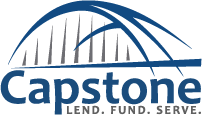
FAQs
Check out the answers to some of our most frequently asked questions. Feel free to contact us for any more questions you may have.
Where does Capstone do business?
We primarily lend in Texas’ major cities and their surrounding areas: Austin, San Antonio, Houston, and Corpus Christi, and Dallas/Fort Worth. We lend in other areas on a case-by-case basis.
What kinds of properties does Capstone lend on?
Single-family residential, multi-family residential, rehab properties, fix-and-flips, rentals, urban land, and all kinds of commercial properties.
Will you lend on my Homestead?
No. We don’t lend on homesteads or a borrower’s current residence. All of Capstone’s loans are to be used for business purposes. The property cannot be inhabited by the borrower.
Will Capstone lend to my LLC?
Yes! The majority of our loans are served to real estate investment companies.
Are there any upfront costs?
Never! We don’t get paid until your loan closes. Borrowers are only responsible for third-party costs such as appraisal fees. These costs can be paid directly to the third party.
What loan-to-value requirements does Capstone offer?
We prefer 70% or less. But we’ve considered as high as 75% for strong asset and borrower situations.
What are Capstone’s loan limits?
Our typical loan range is from $100,000 to $2M. These limits aren’t always set in stone, as all loans are considered on a case-by-case basis.
What criteria does Capstone use to approve a loan?
The primary criteria is the project’s loan-to-value (LTV) ratio, market demand for the project, borrower’s experience and ability to service the debt, and an achievable exit strategy. Depending on the nature of the project, other criteria may be evaluated before loan approval.
How long does it take to approve and close a loan?
We can typically approve loans within 24 hours or less. We often close in as fast as seven to ten days with an appraisal in hand.
Hard Money FAQs
Hard money loans are different from traditional mortgages. Here are the most common questions we get surrounding hard money.
What’s a hard money loan?
Hard money loans are repaid quickly (from 12 to 24 months), based on the property’s value, and are typically provided by private companies or individuals. Hard money loans are based on the borrower’s investment portfolio and the property’s value rather than their creditworthiness. They close much faster than a traditional mortgage which can mean the difference between securing the property or losing it.
Unlike traditional loans which base their loan amounts on a property’s appraised value at the time of origination, hard money loans often are often based on the property’s after-repair-value (ARV). This is especially useful for new construction and fix-and-flip projects.
What’s a commercial bridge loan?
You may hear commercial bridge loans called “gap” financing, “swing” financing, or simply “hard money” financing. They’re all referring to the same kind of loan: a short-term solution to “bridge” the time between purchasing the property and making an exit.
Why is it called a “hard” money loan?
Hard money loans are collateralized by hard assets. Rather than credit scores and income, the property’s value is a major part of what determines a borrower’s loan terms.
